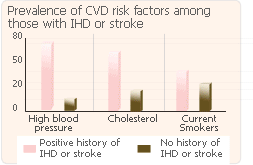
Depression is known to be a risk factor of clinical heart disease. A person displaying high levels of symptoms of depressions is at a greater risk of recurrent coronary heart disease events. And this is just not for the unwell. The otherwise healthy patients with depression are also more susceptible to coronary heart disease. This study was developed to test if middle aged women, with a history of reoccurring major depression, would show traces of atherosclerosis.
Atherosclerosis is a condition in which the artery wall thickens due to cholesterol buildup. It can sometimes prove to be fatal if enough plaque builds up to block arteries thus preventing blood flow. Previous studies have found that depression (sometimes due to fluctuating hormones) was associated with the development of coronary heart disease in patients that were healthy prior to the onset of the disease.

In this current study, 210 healthy, middle-aged women enrolled in the Study of Women's Health Across the Nation (SWAN). The enrollees who had reoccurring boughts of serious depression because of hormones were at twice the risk of plaque buildup than the participants that only had a single episode of depression or no history at all. This development suggested that multiple episodes of depression was associated with an early risk of atherosclerosis.
Participating in this study were 152 white and 58 African American women who may or may not have already gone through menopause. All SWAN participants underwent yearly follow-ups. During these follow-ups, physiologic and psychological measurements were taken. Blood samples were also taken and the woman's menstrual cycle was measured. If the woman had already gone through menopause, specific adjustments were also made.
Results
Out of the 210 participants, 103 women were reported to have coronary calcification and 144 aorta calcification. Coronary calcification occurs when the interior lining of the arteries develops plaque. This occurs due to excessive amounts of consumed cholesterol and fat or if waste materials calcify in the arteries. Smoking, high blood pressure, and diabetes also affects calcification. It restricts blood flow and increases the risk of chronic chest pain, heart attacks and possible heart failure.
The participants that had recurrent major depression were significantly more likely to show evidence of coronary calcification compared with women who only had one experience with depression or none at all.
Adjustments were made for menopause, use of hormones and waist-hip ratio.
Plaque buildup takes years or decades before health problems occur. Because of this it is important to make sure hormones are in order and to make healthy lifestyle choices. Women should schedule regular checkups with their physicians to check for early signs of coronary calcification. If let untreated, surgery may be required or the buildup can prove fatal.